Speakers are an important part of any music system, whether it’s for your home theater or your car. But like any other electronic item, speakers don’t last forever and will need to be replaced at some point.
Many people ask How long do speakers last? and the answer depends on various factors, including usage, maintenance, and environmental conditions.
While some speakers may last for many years with proper care, others may fail or deteriorate relatively quickly.
In this article, Hookeaudio will explore the factors that impact the lifespan of speakers and provide some tips for maximizing their longevity.
Contents
Do Speakers Wear Out?

Yes, speakers can wear out over time, especially if they are used frequently or are subjected to high volumes.
Heat, humidity, and other environmental variables can damage a speaker’s cone, surround, and voice coil. This can cause the microphone to lose sensitivity, distort, and sound worse overall.
Also, the electrical parts of a speaker, like a magnet and voice coil, can break down over time due to temperature stress. This can lower the amount of power that the speaker can handle.
Use speakers within their limits and avoid excessive temperatures and humidity to prevent wear.
How Long Do Speakers Last?
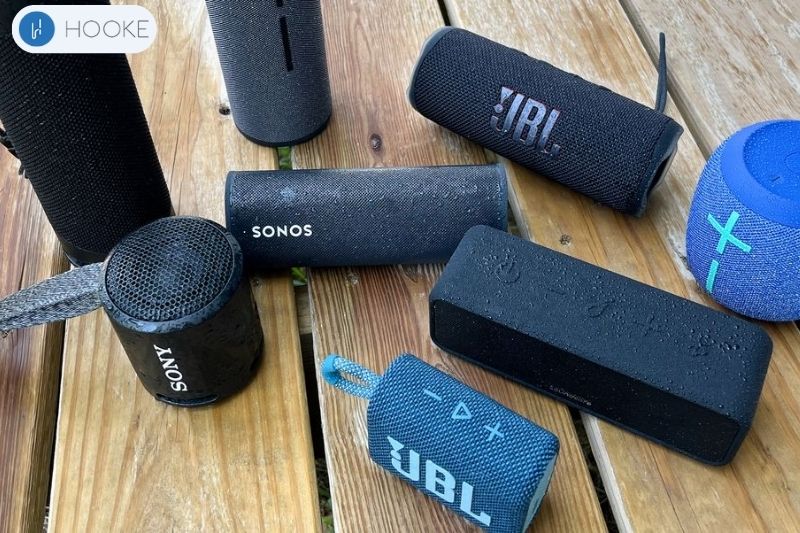
Speaker longevity depends on many aspects, including quality, frequency of usage, and upkeep.
Well-maintained high-quality speakers can endure for years, whereas lower-quality speakers may need to be updated more often.
One factor that can affect the lifespan of speakers is their construction. Higher-quality speakers, such as those with larger car coils and stronger magnets, can endure more abuse.
However, frequent use or extreme conditions can wear out even excellent speakers.
Another factor that can affect the lifespan of speakers is how they are used. Speakers used at high volumes or for lengthy durations wear out faster than those used conservatively.
It is also important to use speakers within their specified limits, as exceeding these limits can cause damage to the speakers.
Proper maintenance can also help prolong the life of speakers. Dirt and dust can damage speaker components over time, but regular cleaning can avoid this.
Speakers should also be stored in a cool, dry environment to avoid moisture and humidity damage.
Speakers can live for years or decades, depending on the conditions above.
Take care of your speakers and use them carefully to extend their lifespan.
What Causes Speakers To Deteriorate?
Power surge
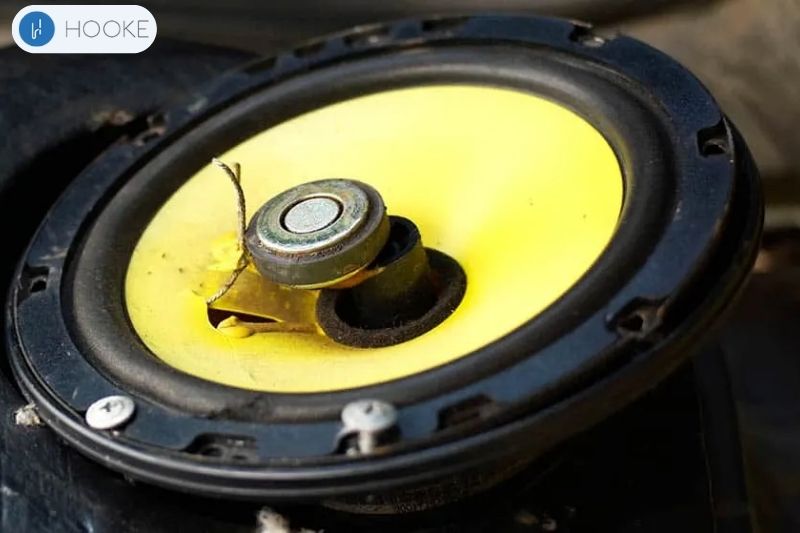
Power surges can be one of the causes of speaker deterioration, particularly if they occur frequently or are severe.
Lightning strikes, power outages, and other electrical problems can cause transient voltage. These surges can cause damage to electronic devices, including speakers.
A power surge can cause the voice coil and other speaker components to overheat. This can cause the coil to overheat and potentially burn out, leading to a loss of sound quality or complete speaker failure.
This can harm the speaker’s power supply, amplifiers, and other electrical components, affecting its performance.
An uninterruptible power supply (UPS) or surge protector can safeguard your speakers from electric surges.
These devices protect your electronics from transient voltage by regulating the voltage they receive.
To prevent power outages, your home or office’s electrical wiring must be grounded and up-to-date.
Physical trauma
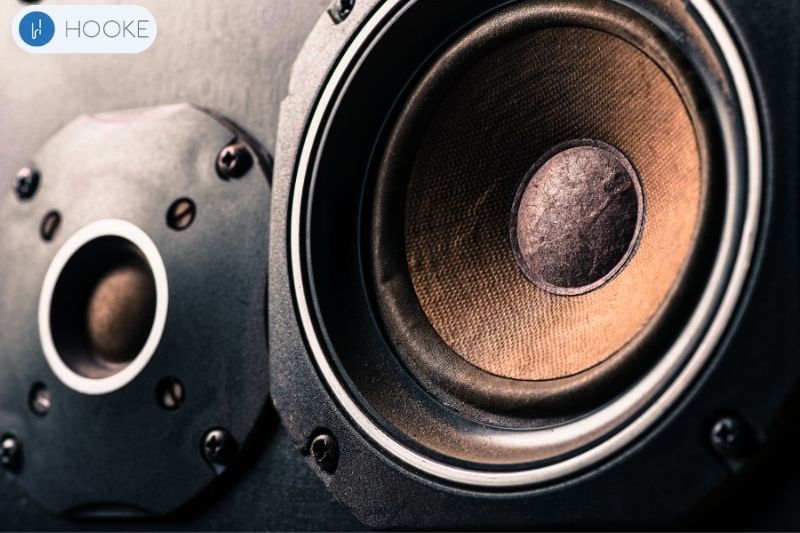
Physical trauma or damage can be another cause of speaker deterioration. Dropping, bumping, or knocking over speakers can cause physical harm.
The cone, surround, and voice coil might be damaged by these accidents, affecting sound quality.
When a speaker is physically damaged, it can cause distortion or a loss of sensitivity. The damage can also affect the speaker’s ability to handle power and reproduce sound accurately.
For example, a torn or damaged cone can cause uneven frequency response, while a damaged coil can cause a loss of sensitivity and distortion.
To prevent physical damage to your speakers, it is important to handle them carefully and avoid dropping or bumping them.
Remember to keep them in a safe place where they won’t be knocked over or broken as easily.
Additionally, using protective covers or cases can help protect your speakers from damage during transport or storage.
If your speaker does become physically damaged, it is important to have it repaired by a professional. Attempting to repair the speaker yourself can cause further damage and potentially render the speaker unusable.
A professional repair technician can assess the damage and make the necessary repairs to restore the speaker’s sound quality and functionality.
Burn-out

Burn-out is another factor that can cause speakers to deteriorate over time. The coil overheats and burns out when the speaker receives too much power or voltage.
If the amplifier or receiver is set too loud or the speaker is played at high volumes for a long time, this can happen.
When speaker experiences are burn-out, it can cause distortion, loss of sensitivity, and other sound quality issues. The damage can be irreversible and may require the speaker to be replaced or professionally repaired.
Burn-out can also harm other speaker system components like the amplifier or receiver, lowering sound quality.
To prevent burn-out, it is important to use speakers within their specified limits. This includes playing them at reasonable volumes and avoiding extended periods of use at high volumes.
Match the speaker’s power handling capacity to the amplifier or receiver to prevent excessive power from being sent to the speaker.
If you suspect that your speaker has experienced burn-out, it is important to have it professionally assessed and repaired. Attempting to repair the speaker yourself can cause further damage and potentially render the speaker unusable.
A professional repair technician can assess the damage and make the necessary repairs to restore the speaker’s sound quality and functionality.
Cone and surrounding deterioration
Over time, a speaker’s cone and surrounding material can deteriorate, affecting performance. The cone and surrounding material produce sound and protect the speaker.
Air, moisture, and other external conditions can make the cone and surrounding material brittle, shatter, or disintegrate. This can lead to distortion, loss of sensitivity, and other sound quality issues.
Additionally, a damaged cone or surrounding material can also affect the speaker’s ability to handle power and reproduce sound accurately.
To prevent cone and surrounding deterioration, it is important to keep speakers in a dry and controlled environment. Exposure to moisture, extreme temperatures, and direct sunlight can accelerate the deterioration process.
Avoid using harsh cleaning chemicals on the speaker’s surface as this can cause damage to the surrounding material.
If your speaker does experience cone or surrounding deterioration, it is important to have it professionally repaired or replaced. Attempting to repair the speaker yourself can cause further damage and potentially render the speaker unusable.
A professional repair technician can assess the damage and make the necessary repairs to restore the speaker’s sound quality and functionality.
Loosened connections
Over time, loose connections can degrade speaker sound. When speaker connections become loose or rusted, sound quality, distortion, and even sound loss might ensue.
Loose connections might potentially damage the speaker and other car system components. When the speaker doesn’t get enough power, the amplifier or receiver may overcompensate, causing damage.
To prevent issues caused by loose connections, regularly check and maintain connections between the speaker and other components in the sound system. This includes ensuring that all cables and wires are securely connected and free from any damage or corrosion.
Regular cleaning and maintenance of audio components can also help to prevent loose connections from forming.
Ferrofluid dry up
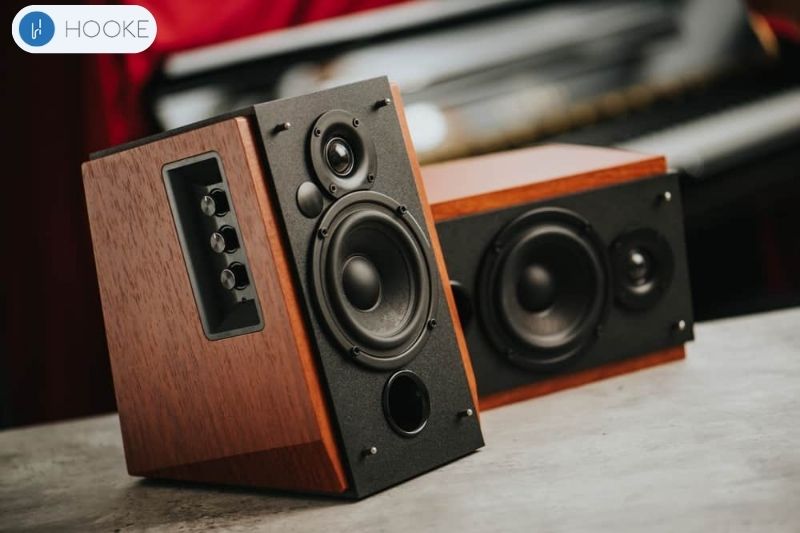
Ferrofluid drying up can also cause speakers to deteriorate. Ferrofluid cools and lubricates speaker magnets and voice coils.
High temperatures, humidity, and other environmental conditions can dry, thicken, or harden ferrofluid.
Ferrofluid drying up can affect voice coil movement, causing distortion, lack of sensitivity, and other sound quality difficulties.
Dry ferrofluid can also rub the coil against the magnet, damaging the speaker’s internal components.
Keep speakers in a low-humidity, temperature-controlled environment to prevent ferrofluid drying.
Cleaning the speaker and checking for damage can also prevent dried ferrofluid.
Electronics wear out
As electronic components that power and drive speakers wear out, speakers can deteriorate.
The amplifier, receiver, or other electronics that power the speaker can break down, reducing power or sound quality.
Electronic wear can also cause signal distortion, sensitivity loss, and other sound quality difficulties. Worn components may not transmit enough power or signal to the speaker, reducing sound quality and performance.
Maintaining the stereo system prevents electronics wear from compromising speaker performance. This includes looking for frayed wires or loose connections and fixing them.
Speaker electronics can last longer with regular cleaning and maintenance.
Do Old Speakers Sound Bad?
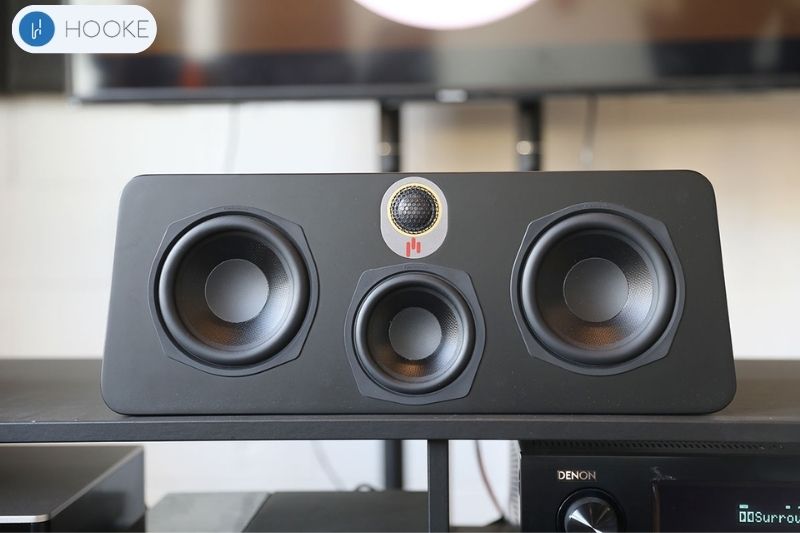
Not necessarily. Older speakers may not have the latest technology, but they don’t always sound horrible.
Older speakers with high-quality materials and craftsmanship still sound good.
That being said, there are some factors that can contribute to bad speakers sounding bad. Long speaker components that have degraded due to age, wear, and tear, or environmental reasons can degrade sound quality.
Additionally, older speakers may not be compatible with newer audio systems, which can also result in a loss of sound quality.
Older speakers may not offer wireless connectivity or advanced equalization settings.
If the speaker is well-built and maintained, the sound quality can still be good.
How Often Should You Replace Speakers?
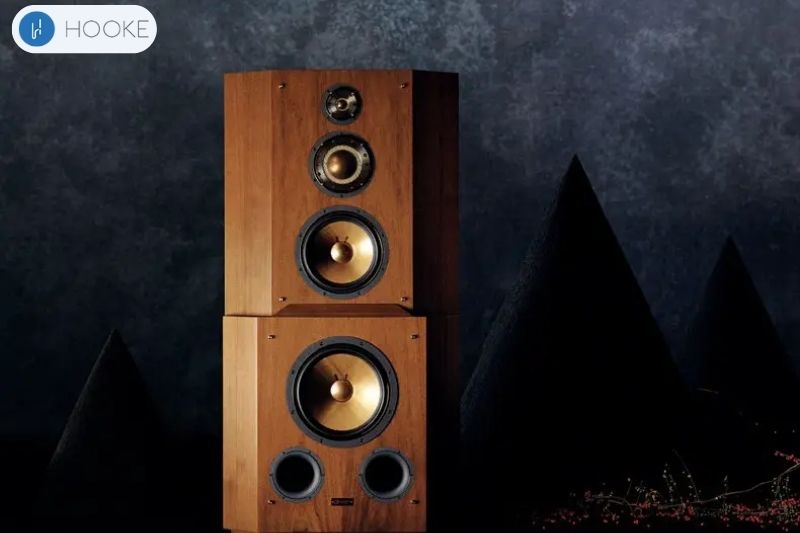
Speaker longevity depends on usage, maintenance, and environmental conditions. As a result, there is no one-size-fits-all answer to how often speakers should be replaced.
However, when speakers start to show signs of deterioration or damage, or when they no longer meet your sound quality or performance needs, replace them.
Signs of deterioration can include distortion, loss of sensitivity, crackling or popping sounds, or a loss of power.
If your speakers don’t work with your audio system or fulfill your listening needs, replace them.
If you upgraded to a high-end sound system and your speakers don’t meet your needs, it may be time to get new ones.
The decision to replace speakers depends on their age, quality, compatibility with your audio system, and listening preferences.
If you’re not sure if your speakers need replacing, an audio specialist can evaluate them and give recommendations.
What to Do With Old Speakers?

When it comes to old speakers, there are a number of options for what to do with them. Here are a few ideas:
- Sell them: If your speakers are still in good condition and can be used by someone else, you may be able to sell them. Online marketplaces such as eBay, Craigslist, and Facebook Marketplace can be good places to find buyers.
- Donate them: Donate your old speakers to a charity or nonprofit that accepts audio equipment instead of selling them. This can be a great way to give back to your community and help someone else enjoy music or other audio content.
- Recycle them: If your old speakers are no longer functional or in poor condition, you may be able to recycle them. Many cities and towns accept old speakers and other electronics for recycling.
- Repurpose them: If you’re feeling creative, you can repurpose your old speakers into something new and useful. For example, you could turn them into bookshelves, planters, or even pieces of art.
- Keep them: If you have sentimental attachment to your old speakers, or if you think you may be able to use them in the future, you can always keep them. Just make sure to store them properly to prevent further damage or deterioration.
FAQs
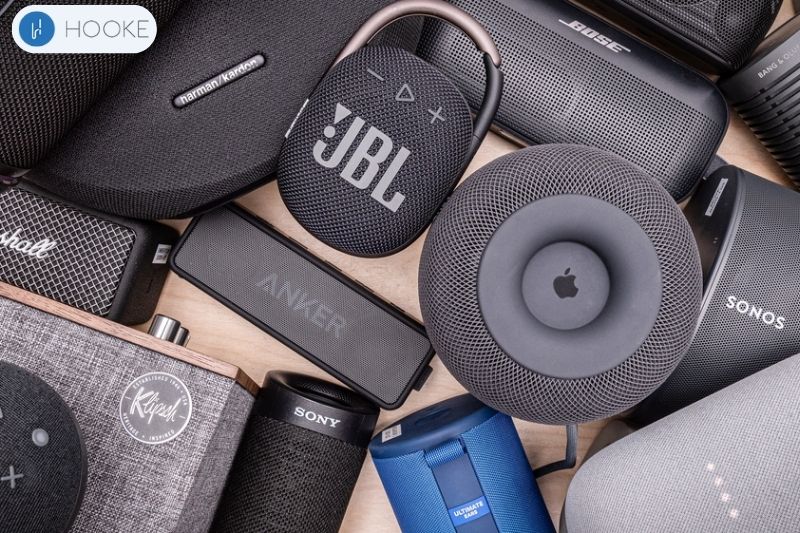
Are Old Speakers Worth Anything?
Condition, age, brand, and other variables may make vintage speakers valuable. Collectors value rare, good old speakers over broken, outdated ones.
Are Vintage Speakers Any Good?
Yes, vintage speakers can be very good. Many old speakers still sound good due to their excellent materials and craftsmanship. Old-time speakers also offer unique qualities that contemporary models lack.
What is The Best Wattage For Home Speakers?
The ideal wattage for home speakers varies depending on the size of the room, the type of music being played, and personal preferences.
In most home listening contexts, speakers with a power handling capacity between 20 and 200 watts are sufficient.
How Long Do Car Speakers Last?
The lifespan of car speakers can vary depending on usage, maintenance, and other factors. On average, car speakers can last between 4-6 years. Well-maintained automobile speakers may survive longer in high temperatures and humidity.
How Long Do Ceiling Speakers Last?
The lifespan of ceiling speakers can vary depending on usage, maintenance, and other factors. On average, the speakers can last between 10-20 years. However, overdriving, dampness, and physical damage can limit their lifespan.
How Long Do Subwoofers Last?
A subwoofer has a lifespan of seven to twelve years, depending on how well it is maintained. Some top-notch subwoofers can endure up to 20 years without losing any bass frequencies or sound quality.
Is replacement speakers for home stereo worth it?
It depends on the condition and quality of the existing speakers, as well as personal preferences and budget.
Conclusion
In summary, speaker lifespan depends on usage, maintenance, and environmental conditions. Some great speakers last for years, but others break soon.
Speakers last longer and perform better with regular cleaning and inspection.
Avoiding overdriving and properly installing and using the speakers can also extend their lifespan.
To ensure high-quality audio from your system, treat speakers well and replace them as needed.

